By Jenny Carew
To live in the middle of the Malagasy rainforest for 10 days will certainly come with it’s challenges. Home comforts are stripped bare, and everyday things we take for granted are replaced by natures refreshing, yet challenging alternative. With no electricity in the daytime (only by solar panels), no wifi, phone signal, showers or running toilets, it was back to basics and I was ready to disconnect and embrace it.
Morning routine:
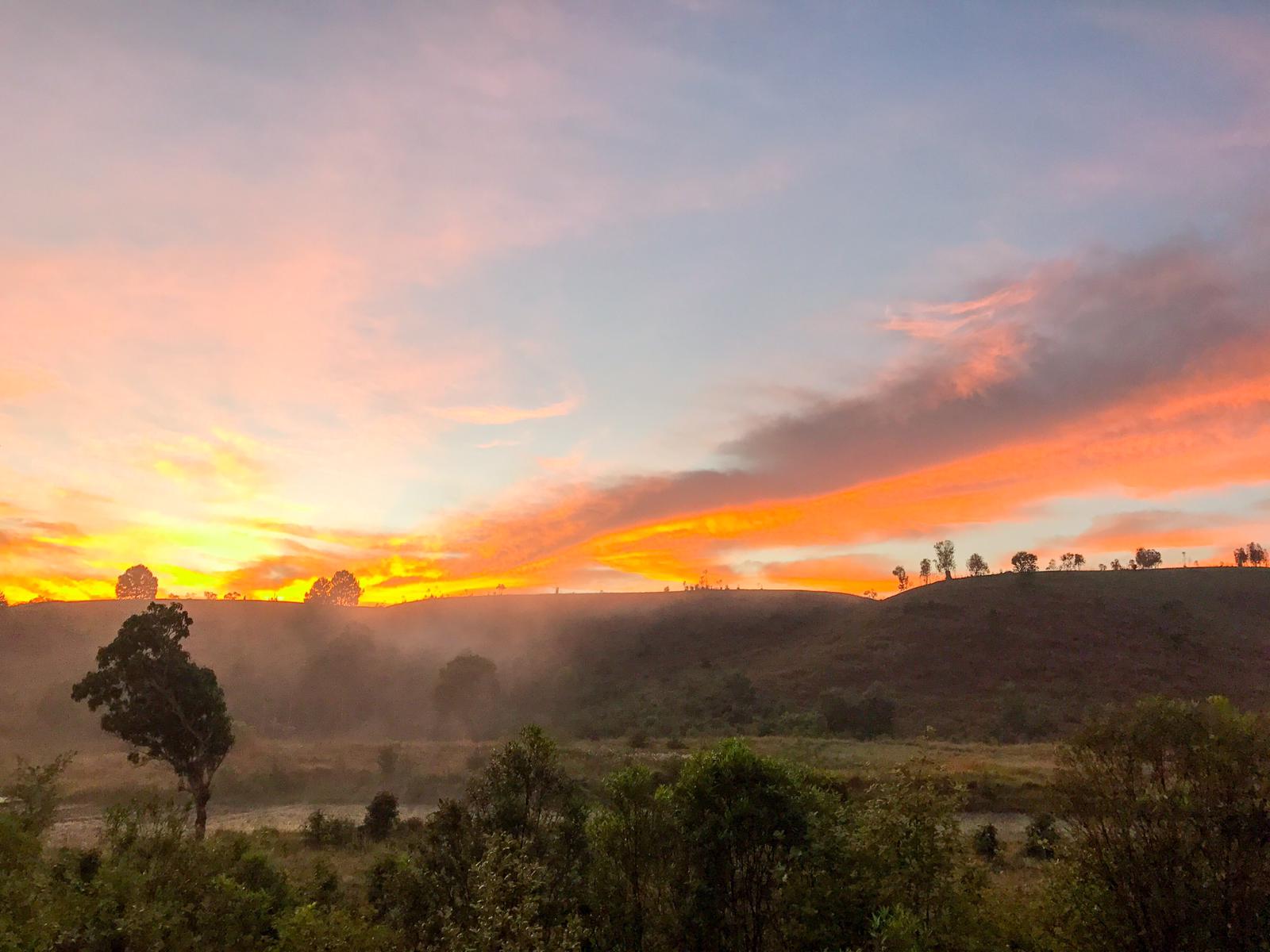
We woke up every morning at 4.30am, to the sound of clanging pots, rustling tents, and the call from the Indri Lemurs. This was complete with a mumbled, tired ‘Good Morning’ as everyone clambered out of their single tents and had a stretch. The mornings in camp were beautiful, the mist would be lifting from the river and it was often the coolest part of the day. We ate around 5.30am every morning, and departed at 6am, unless you were on the lemur trail, where we aimed to leave at 5.30am. The sunrise in the jungle was beautiful, the hazy mist would rise from the river and the morning sun would soon break through and clear it. The indri would call in the morning, and we would hear their call echo down the valley. Other than us, I noticed there was no background noise. No cars, no trains, nothing. Just us and the wildlife. Perfect silence.
Food:
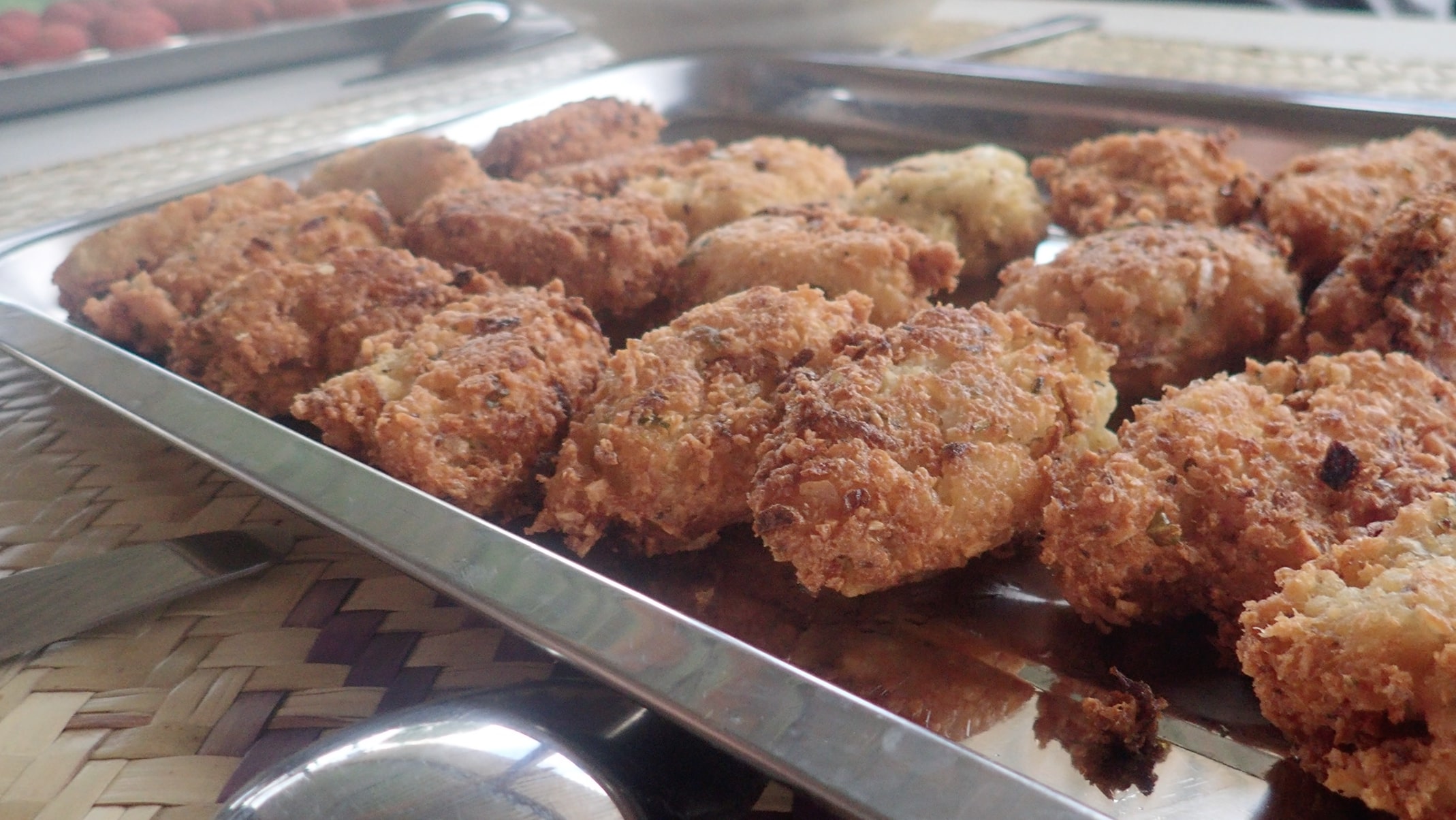
The food is prepared over two fires in the kitchen, which is a small room under tin enclosure. The local guides cook fresh meat and vegetables in large steel pots over a wooden fire, and there’s a fire pit, which is used for the larger pans. As the produce was so fresh, the smells were earthy and whole. The room would be often filled with wood smoke and there was something beautifully simple about it. They cooked for 50 people three times a day, and made it look totally easy.
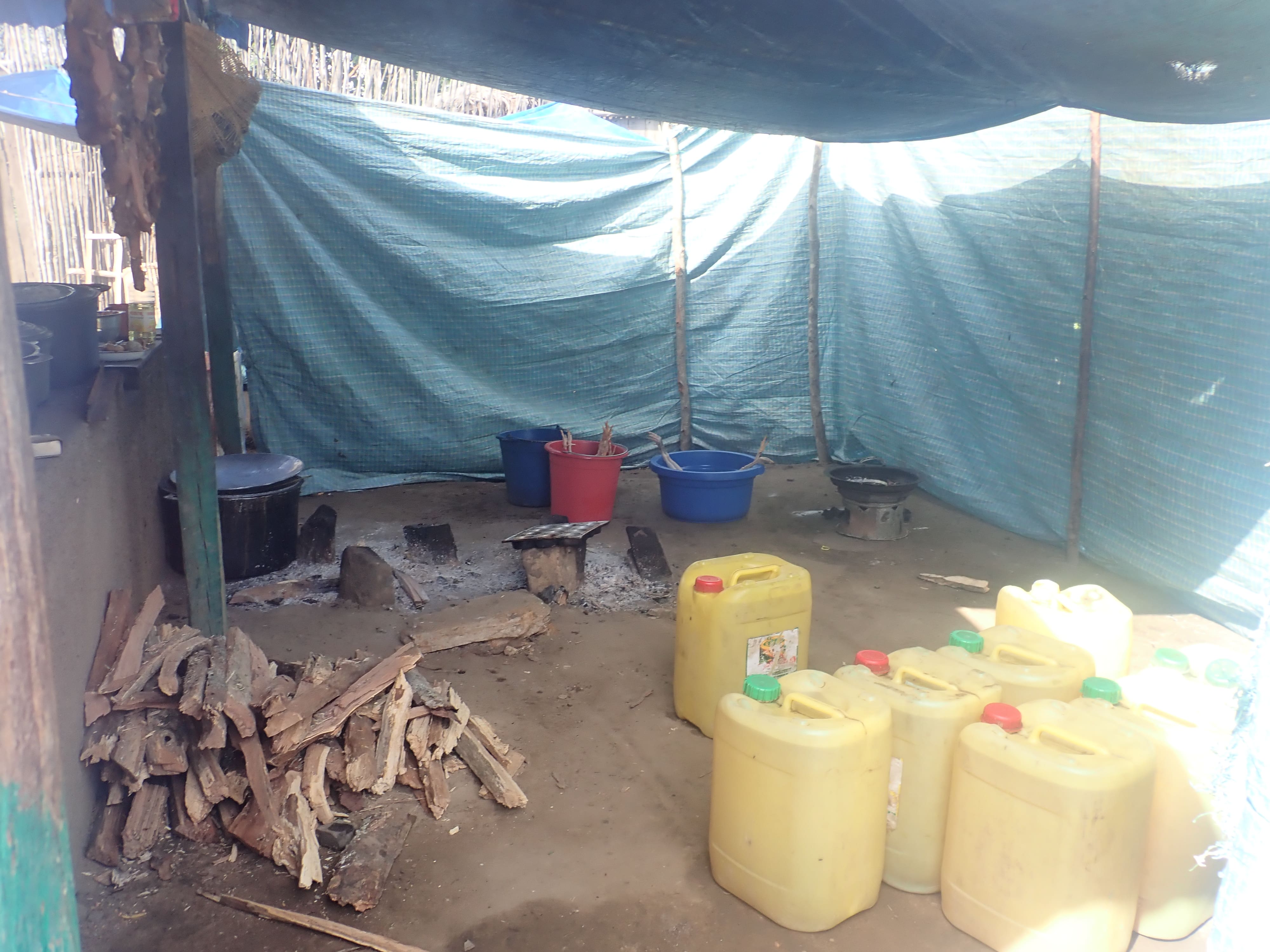
Each grain of rice is handpicked from the rice fields, and sifted for hours. The aim is to separate the grain from the lighter elements, which waft away as you throw it upwards. There’s certainly a knack to it – I tentatively had a go – weary that this is already a couple of hours work and grains on the floor would be wasted (although I’m sure the chickens would soon clear it up!!). I got the hang of it, but soon handed back to the cook who made it look like second nature.
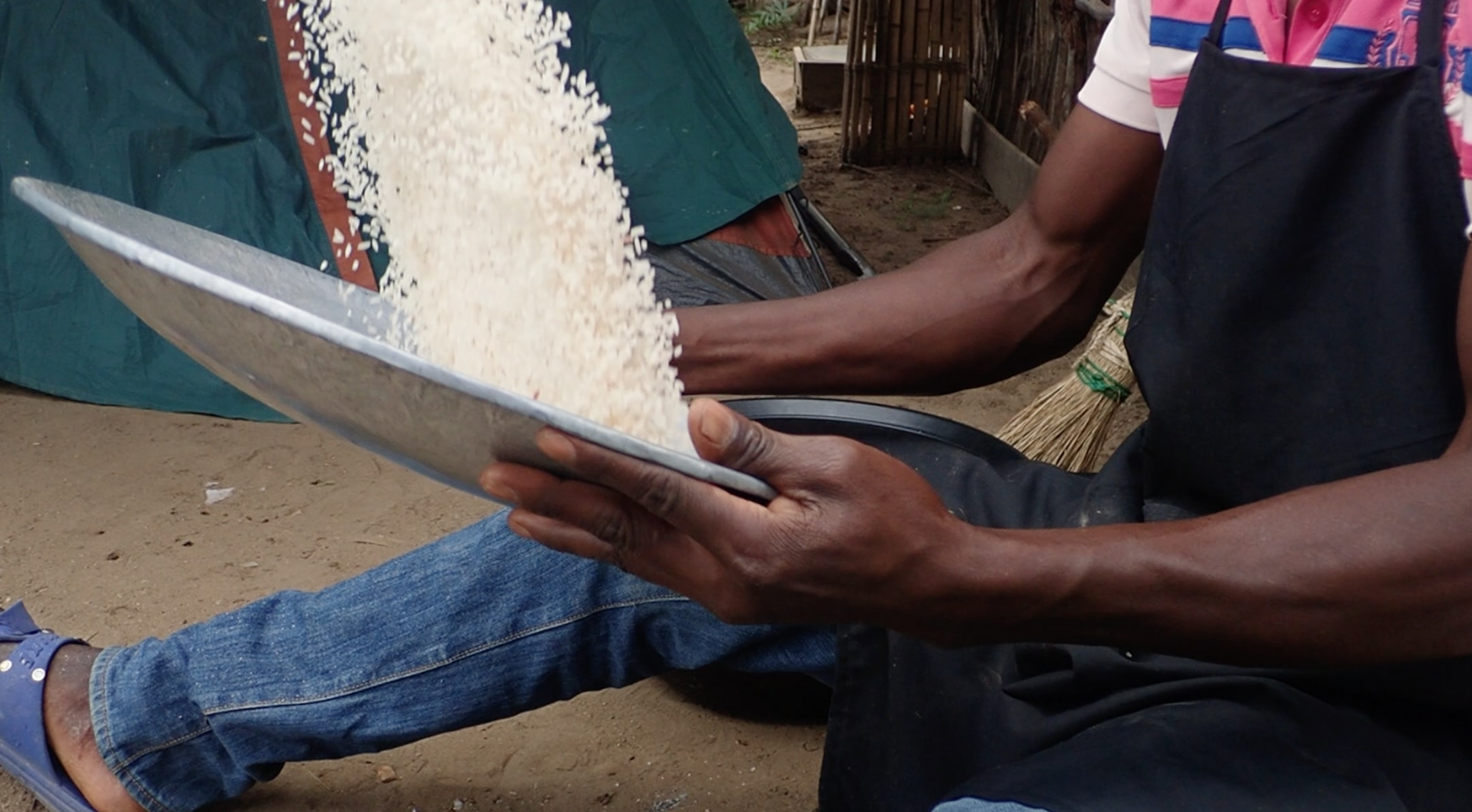
For breakfast, the options would vary. The produce was fresh and amazing. We would have anything from rice, to bits of bread, to sweet potato. One morning, the rice was even purple! Boiled rice at 5.30am in the morning was a concept we soon got used to – it was strange to think how it was only 2.30am at home but here I am in the Malagasy jungle already eating my breakfast of fresh boiled rice.
As we got used to eating rice every day, our taste buds changed. Anything other than beans and rice would cause a stir in the camp. Members from the team had brought ‘ luxury’ items from home. One day, someone produced chocolate spread. I can’t even explain how appreciative we were of this – the smooth chocolate taste was absolute heaven, and we covered bread with it, thicker than I ever had before and appreciated every mouthful! A different morning, someone produced cornflakes. The golden colour was gleaming from the packet and we all had a bowl – we all took a moment to savour the taste, I’ve never been so happy to see cereal in my life!! It’s strange what you value you when you live without it.
We ate three times a day, but we didn’t have a large appetite as the anti-malarial tablets destroyed our hunger. That, coupled with the heat of the day, made you not want to eat a lot. It’s safe to say the low diet and mounds of exercise soon saw us shedding the pounds, and the taste of sweet chocolate or a fresh coffee was a distant dream. We would often sit around and have conversations about food at home- pizza, bbq sauce, a cold soft drink…it’s actually strange what you miss. I’d often say how I’d pay £50 for a coffee and a biscuit half way though the day!
Our gift to camp
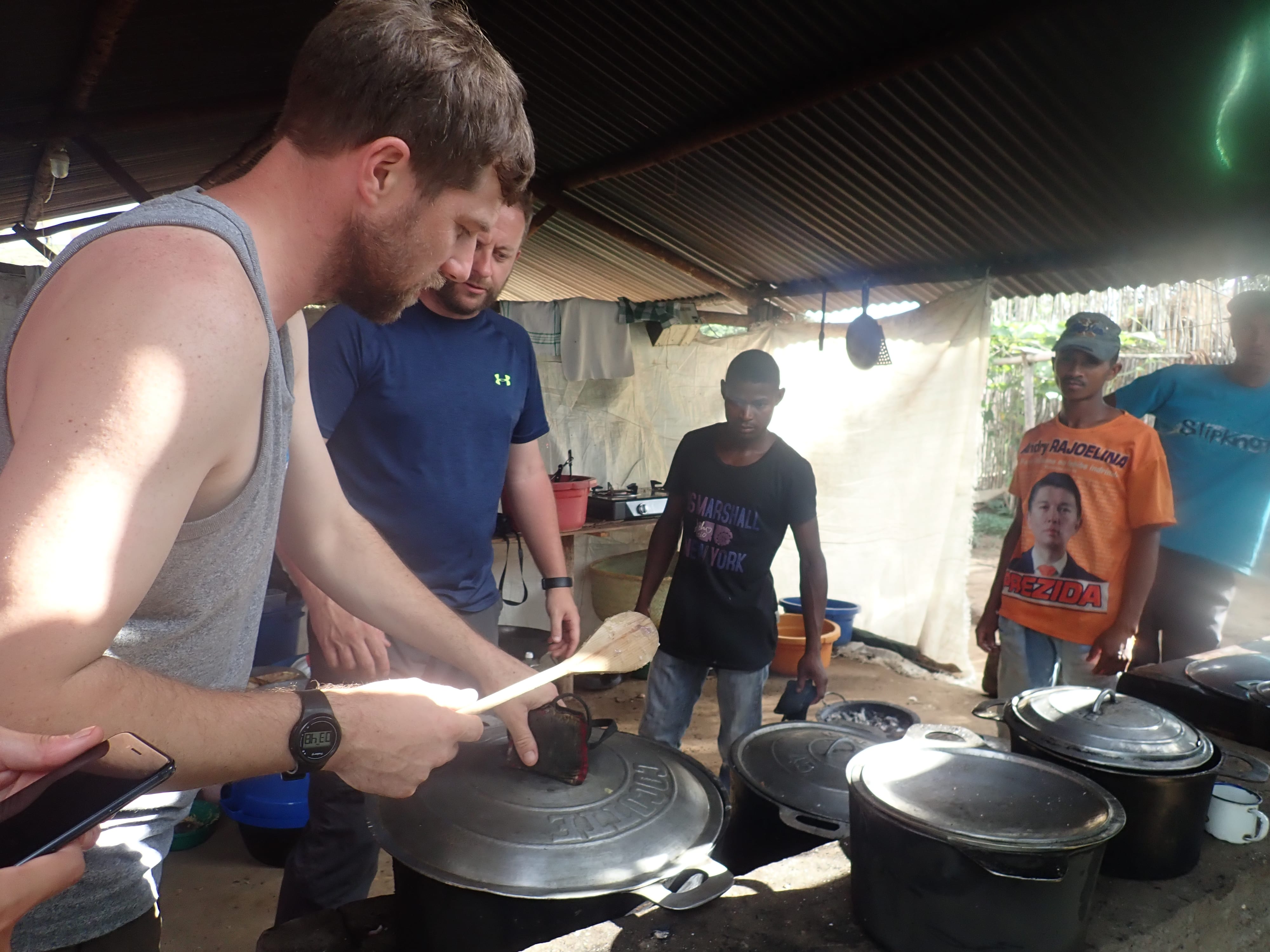
To give something back to the locals and guides who had looked after us so well – we decided that it was our turn to cook. We made a vegetable curry and to be honest – cooking for 50 in the rainforest with a small camp fire was a task we were going to have to pull together for. We created a long list which our hosts drove back to the village to get – returning to camp with crates full of new ingredients.
We all split up in to groups. I chopped the onions and garlic as well as the pineapple that would be for dessert. We played songs as we worked, singing as we went and laughing about odd ingredients and strange vegetables we had never seen before!
The whole team pulled together. We darted to and from the kitchen to see how the curry sauce was coming along – the guys were sweating over a large steel pot over a fire, and the guides were excited to see what we would serve them. We felt it was only right to pay them back. We needed this to go to plan.
We also made Roti’s to go with the curry, so I kneaded the dough and we rolled it up. I never thought I would be in the middle of the jungle rolling out Roti’s – but there is a first time for everything!
Once the curry was ready, we all sat around and watched to see their reaction to our attempt at cooking with their equipment…. It went down a storm. So much in fact that they went back for seconds… and thirds! They spoke about it for days after, so we’re glad that they enjoyed it.
Washing facilities:
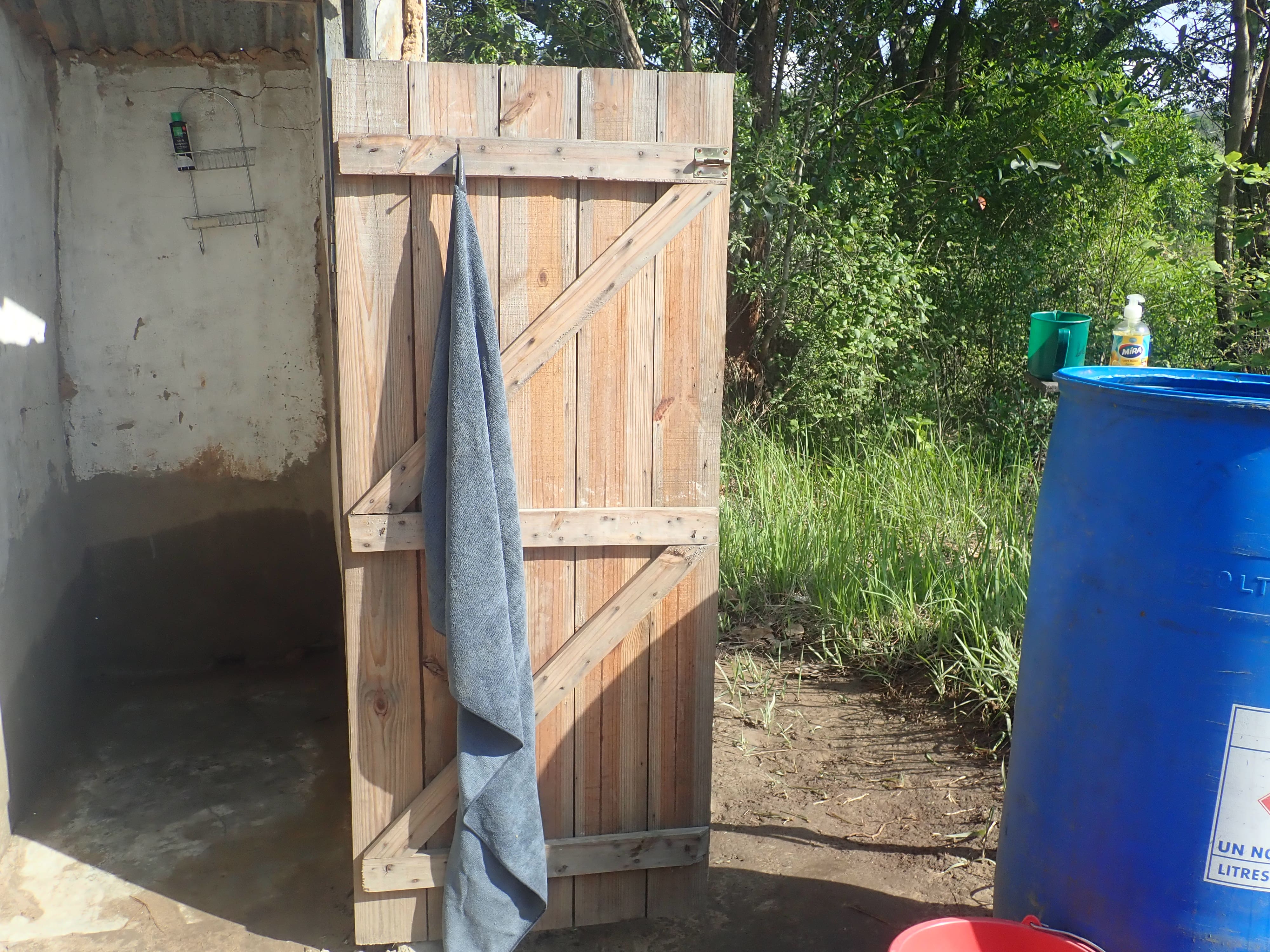
When you’ve been trekking though the humid jungle four hours and return back to camp, all we really want is a nice fresh shower. In camp terms, this meant filling up a bucket from the large plastic drum, which was filled with river water.
The shower blocks were like a concrete cubicle with a small plastic tube at the bottom and a wooden slat door for (some) privacy. The bucket was complete with a plastic cup, enabling you to efficiently slosh yourself down. It was no means warm or without a few bits of grit, but it was far better than being hot and sweaty. The blazing sun would shine on camp all day, so you would probably be clammy again in minutes, but for that short period of time, it was worth it. There was also a lovely golden soil in camp, which would swirl a bit when the wind picked up. Some of us thought we had tanned – but unfortunately it just washed off…
Some of the girls became wise to the fact that there was warm water from cooking in the evenings, so an evening shower always guaranteed warm water. Genius!
As we carried all of our luggage, we had to pack lightly and just wash clothes regularly. Thankfully, a lot of the Craghoppers kit I took with me had in-built Wash and Wear which meant it would dry really quickly and doesn’t need ironing. Again, it was “grab a bucket” technique and scrub some soap into the garment (we had to use special soap which wouldn’t hurt the environment) … we sat down on a dusty bank and had a chat while we did our camp chores. It was basic, but it was great. We always had a laugh in camp no matter what the job was.
The toilets were rustic to say the least. Basically a hole in the ground in a cubicle that didn’t lock, but at least at night you could judge by the head torch if it was free or not. I won’t go into detail, but let’s say they were earthy and left to nature to deal with.
Tales from camp:
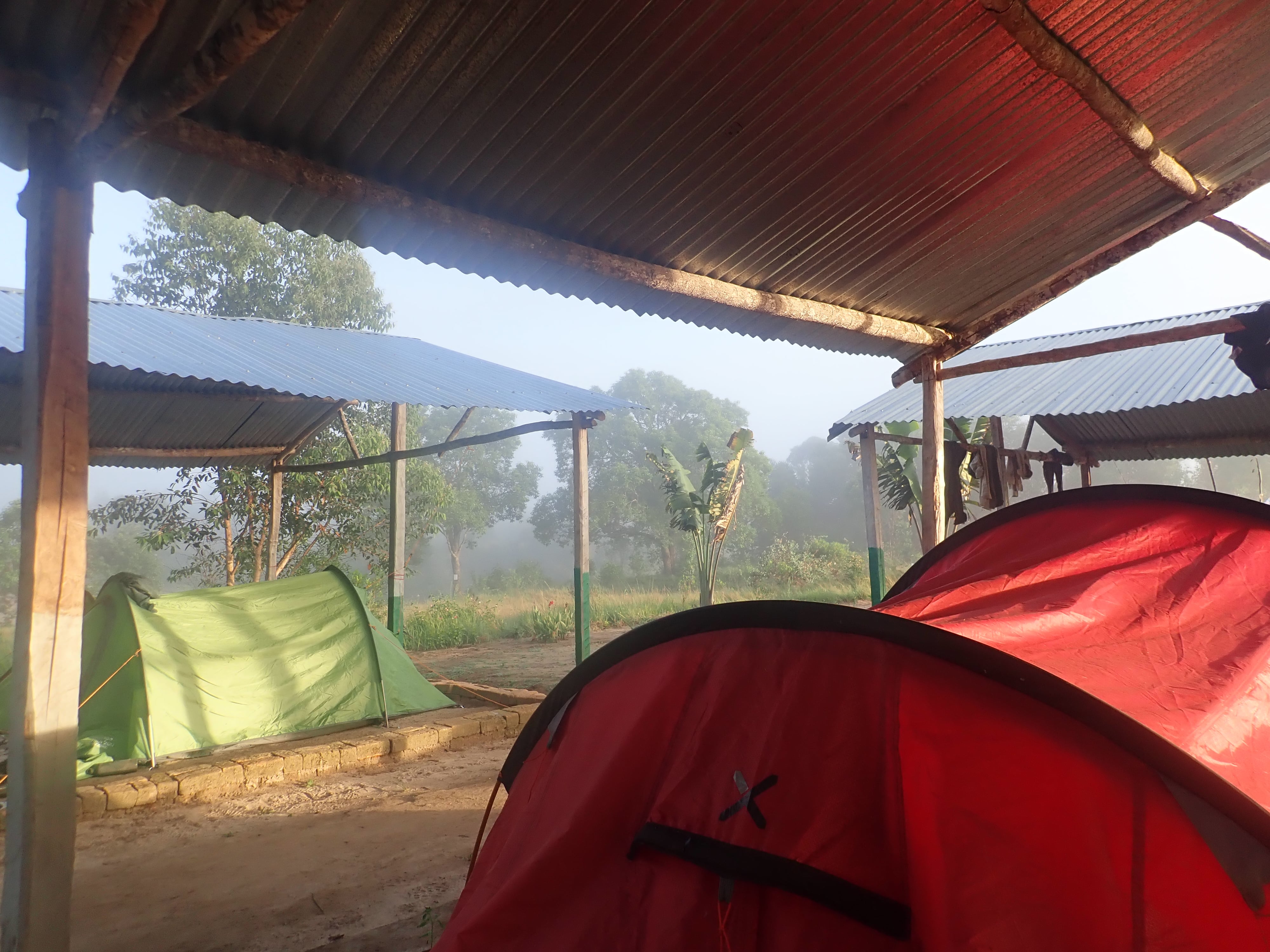
We only had electricity for two hours each evening, which meant a mad dash to the plugs once the noisy generator was turned on. Every time our main light bulb was lit up, swarms of bugs were dancing under the light like a swirling tornado.
Youth For Lemurs took place in camp one afternoon, which was lead by Phil and Nicola to educate the next generation of conservationists in the area. They were mostly teenagers. One afternoon, we were sitting around having a chat, when, from nowhere, a chorus of song broke out in camp. The education group had gathered and were singing and dancing. The tunes were beautiful, fun and so in rhythm.
The evenings were mostly clear, you could see the stars and the galaxy. Phil showed me Orion’s Belt. The star constellation was upside down as we were in the southern hemisphere. The night was quiet and the cicadas were loud yet peaceful.
Suddenly, there were flashes of white light on the horizon of a thunderstorm further away, which lit up in the distance. We thought the storm would be on its way: we hastily got our washing in and sat down for dinner.
The rain held off until I had gone to bed, then the heavens opened. It’s like nothing I’ve seen before. Lashes of rain pelted the earthy ground and ran a stream through the centre of camp. As our tents were under a tin roof, the sound was shattering, like a loud applause over our heads that didn’t fade.
Special Visitors in Camp
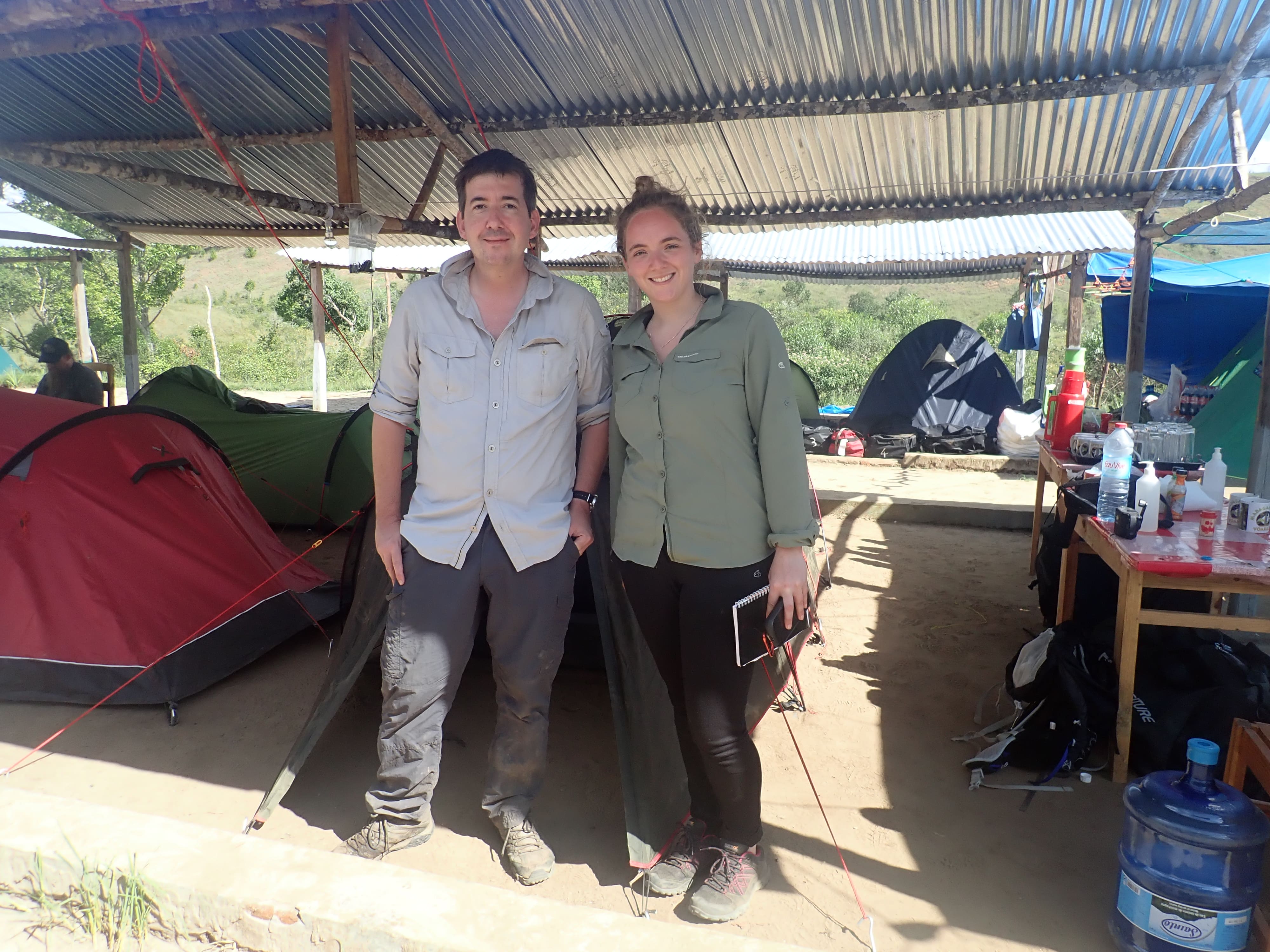
The lazy dust track, which was our main entrance to camp would lie still, apart from the odd farmer passing through. One afternoon, the dust swirled up and a special visitor was on their way. The British Ambassador to Madagascar, Philip Boyle had arrived and was here to visit us for the weekend.
We introduced ourselves and sat down for dinner. He was keen to support the conservation work and it was his first visit to the conservation site. He has known Chester Zoo’s partner organisation Madagasikara Voakajy for some time and wanted to see how the project was helping to protect the rainforest for the future.
Dinner was served, rice, fish and a variety of vegetables. We spoke with the Ambassador over dinner and helped him quickly put his tent up. All we could offer him was a large space for his tent and some valuable chocolate digestives.
Night walk
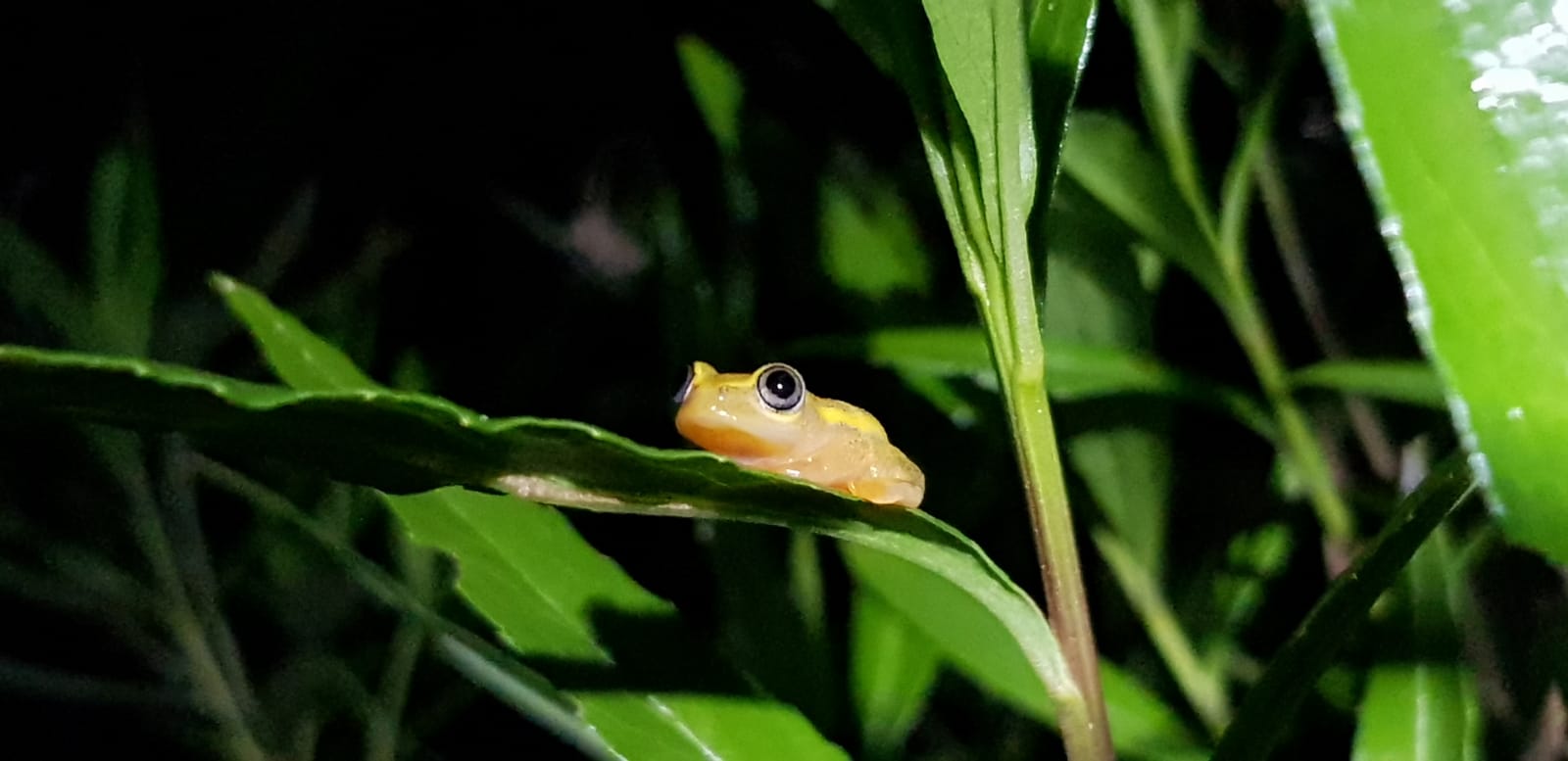
I joined the night walk with the guides and a few members from the team. Our head torches shone deep into the night, illuminating the eyes of lemurs in trees, chameleons, and cicadas. We strode into the night with our head torches on, eager to see what we could see in the dark. We walked in single file through the dry orange hillside complete with tufts of wiry green grass. The grass was so coarse that it would crunch under our boots like snow, and the guides who liked to wear flip-flops would scrape like sandpaper across the countryside’s earthy floor. We carried on into the deep, dark forest, our head torches offering the only available light. I was tired from rising up so early and having done a trek already that day, but it was cooler and fresher than walking in the blistering daylight. It was fun, we saw an array of species such as tree snakes and tree crabs.
We would walk for a while, not necessarily steeply but we would carry on until members of the team would spot things in the bush. I don’t know how – the chameleons Chad changed to look like the bark of the tree and fitted in so well.
Wildlife in Camp
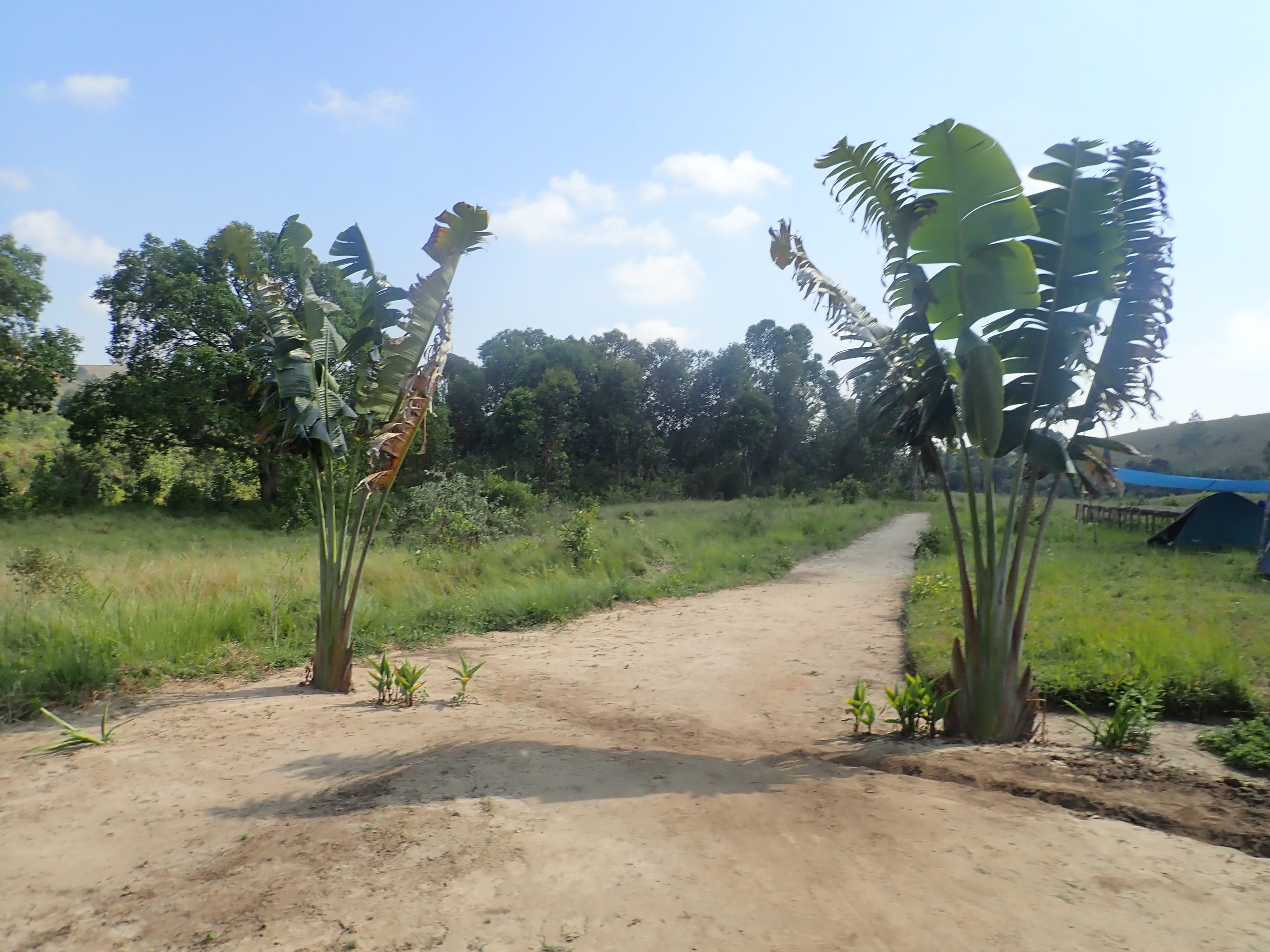
Some days, the herpetology team needed to take biometric measurements of various animals, including golden mantella frogs, snakes and pill bugsbugs, as part of the important survey work.
They would be carefully measured and weighed and I would help out where needed. It was great to witness the team from Chester Zoo work alongside locals, teaching them how to measure the amphibians and record their weight. The pill bug, which looked like a massive wood louse, pretty much filled my hand when I picked it up. It’s legs felt like a toothbrush, lightly brushing along your palm.
As we didn’t communicate in the day, it was exciting to welcome the teams back to camp and share stories of what we had seen in the day. There was a sense of anticipation as we spotted other groups walking back along the windy, dusty path. We were eager to hear what they had seen, and in some cases, encountered at very close quarters. One day, Iri (Deputy Curator of Lower Vertebrates and Invertebrates at Chester Zoo), took the measurements of a big tree boa. The team swarmed around to help and I (having a BIG fear of snakes) decided to kick my fear and get face to face with a snake. Well, I thought, there’s no better team to be with if I was ever going to get over it!
We walked back to camp one day, when there stretched across the path was a Madagascan hog nose snake. It was basking in the sun that was beating down on the open path. Emile, our guide, turned to me and said ‘I’ve got a hole in my bag’. It didn’t click to be honest, what did he mean. He stood in front of me, gesturing his worn sports bag, with frayed straps and holes in the top. Ah – ok. It clicked.
“Matt” I said urgently “I’m not having a snake in my bag… it’s going to have to be yours”. Being the gentleman that he is, he swung his rucksack off his back and unzipped his bag and found a smaller, secure bag inside. “This will do! Won’t it Enil!” The guide pondered for a second, before taking it off Matt, striding towards the snake and hovering over it. Then, before it could slide off in to the bushes, he quickly caught it and carefully secured it in the bag.
We hastily walked towards camp, eager to show everyone what we had in the big bag. I told Iri who is an expert in snakes at Chester Zoo about what had happened so we could release it back to the same place. Iri checked over the snake to make sure it was in good health, before he weighed and measured it.
The team had also surveyed frogs, centipedes and other insects, so it was great to see their skills in action.
A minute to speak to home
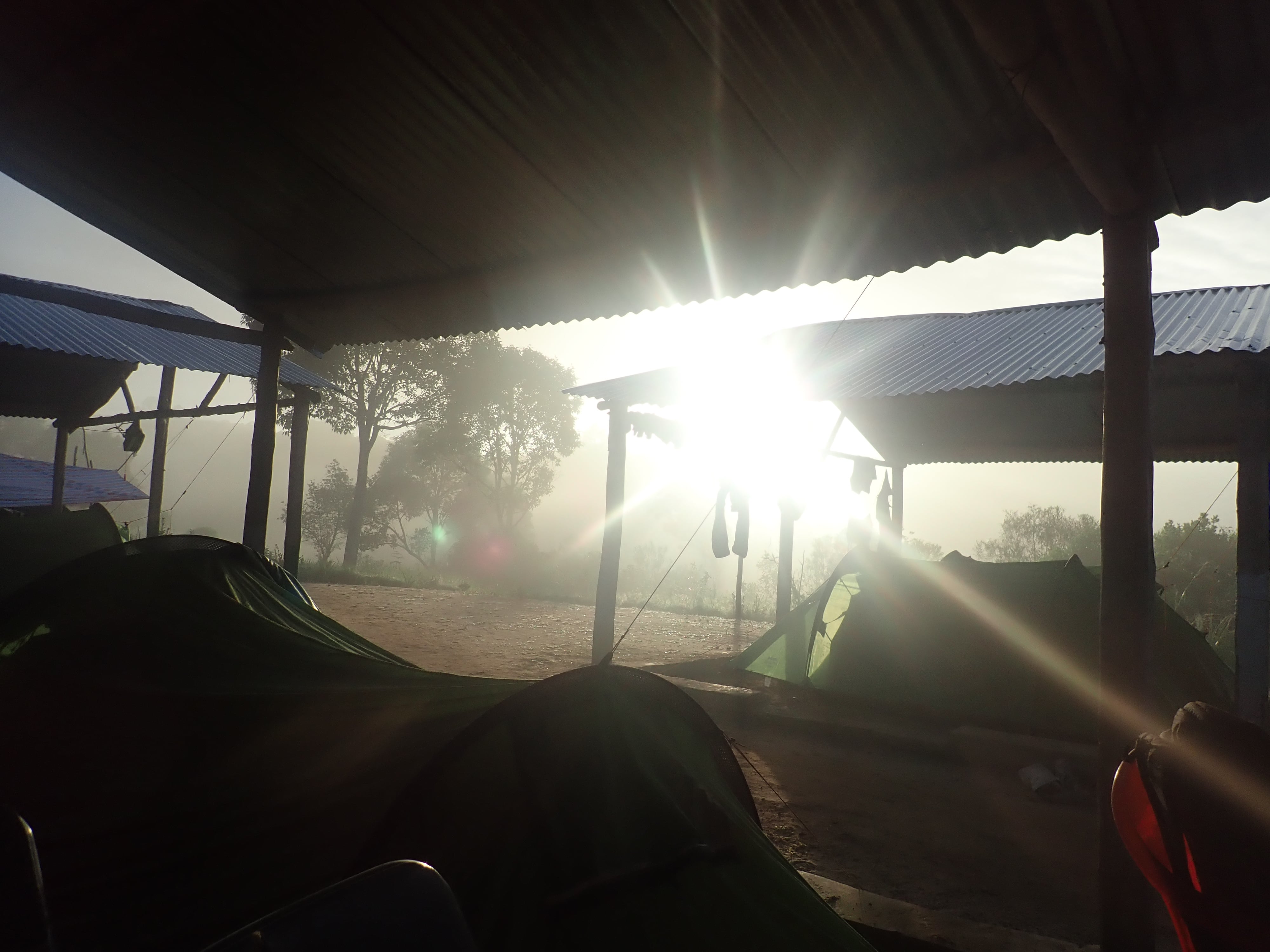
When we were out on walks, on the highest peak of the hill, you would get a flash of one bar of signal, before it quickly disappeared again, so it wasn’t enough to send or receive a message. As time went on, the feeling to have just 10 seconds speaking to a loved one would be enough. So, one afternoon, when the hottest part of the day had a passed, I discovered some of the others also felt like they wanted to check in with families.
We walked to the top of the hill to find just an ounce of signal. We slowly walked up the mountain, holding our arms stretched out and wafting our phones. Signal came. And then went. So we nearly gave up, and went to sit at the top, overlooking camp. “I’m going to try once more!” I said, so walked close to the girls and punched in the numbers to keypad.
There – on the top of a mountain in Madagascar, it connected and faint “hello?” rang down the line “can you hear me?”. It was an odd experience, I had so much to tell my family but I didn’t know quite where to start. The signal was weak so I knew I had limited time so I had a quick conversation. It was happy and sad at the same time, but we walked back to camp elated to know all was well back home.
General
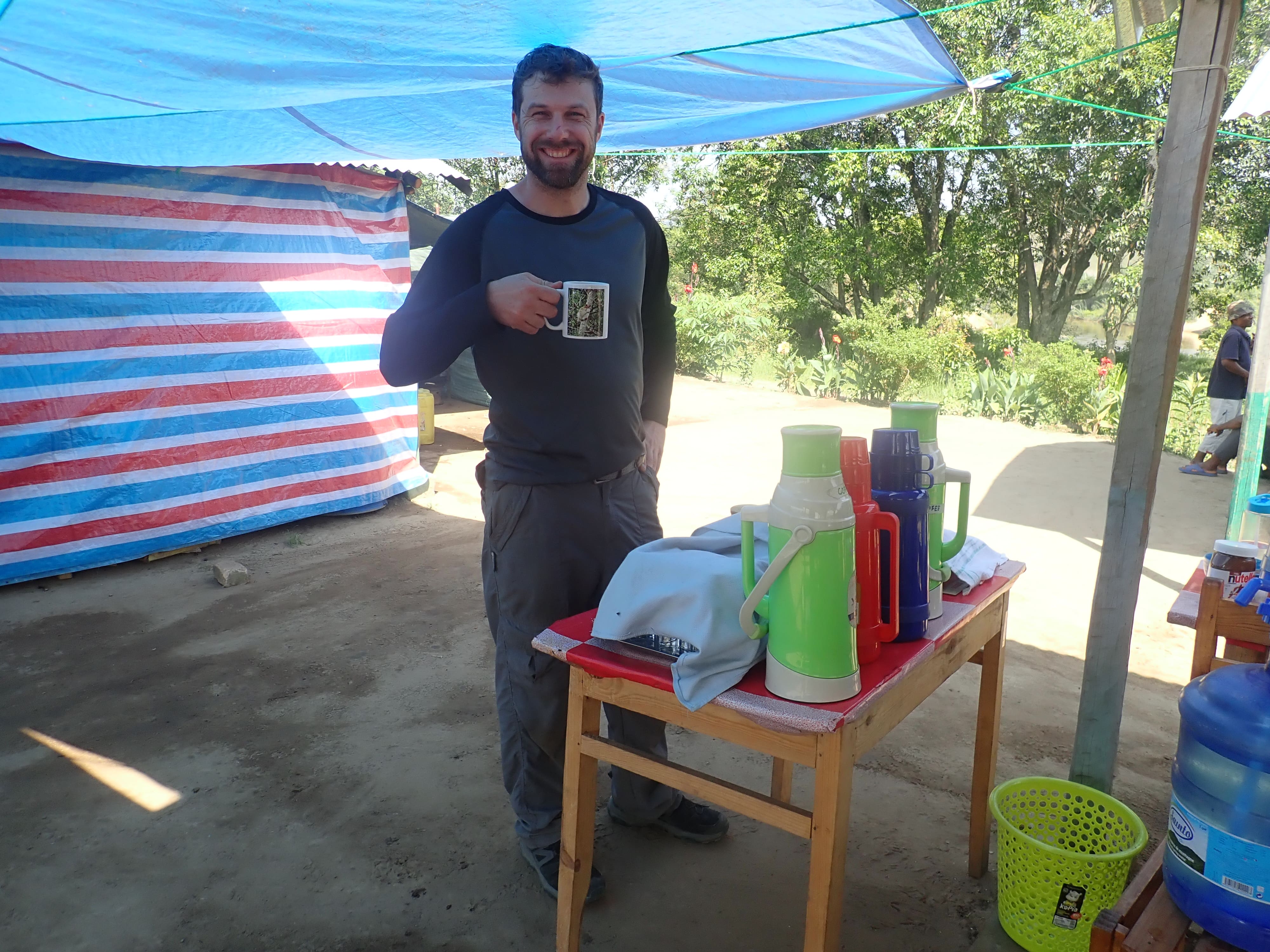
In the evenings, we would often sit around and talk. It was amazing having no connection to the outside world most of the time – and we soon started really deep conversations, start joking or play some cards.
One night, I sat with Pip, Matt, Gareth and Becca. We gathered around the table on old wooden chairs and spent the majority of the night laughing. We talked about childhood TV shows, with most of the conversation starting “who remembers…” and laughing about impressions we could do. It’s mad what you talk about when you have no other form of entertainment. I’m really enjoying not having signal – disconnecting from technology and connecting with the world.
The 5km walk back to camp was always difficult. One day, we ventured back in about an hour and a half, and met the herpetology team on the brow of the hill walking towards us. Our rucksacks weighed heavy on our backs and water ran low. The others could obviously see our exhaustion and after a brief chat they turned and smiled and said “Oh, and the camp’s out of bottled water now so we’re drinking boiled water from the river”. The river was a murky brown and often had cattle and other unidentifiable objects floating through it. “Joking…” they smiled.We shook our heads and laughed “we believed you for a second!” and walked back down the hill towards camp.
Playing jokes on each other became our form of entertainment, as we found out a lot about one another (sometimes a bit too much…) but the sense of camaraderie and team spirit was fantastic. I don’t think you can plan to have a great team morale – it’s just something that either works or doesn’t. But I can safely say, I’ve made some friends for life.